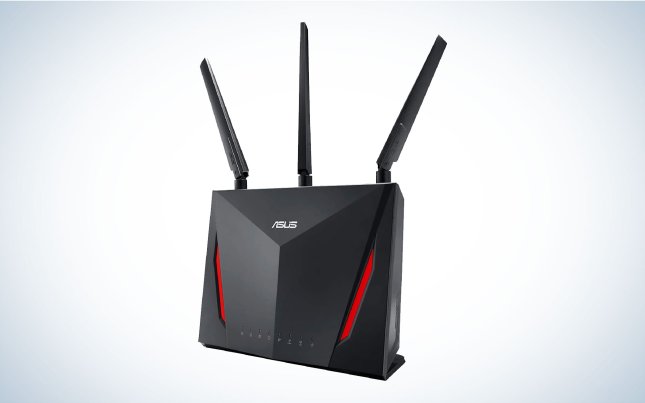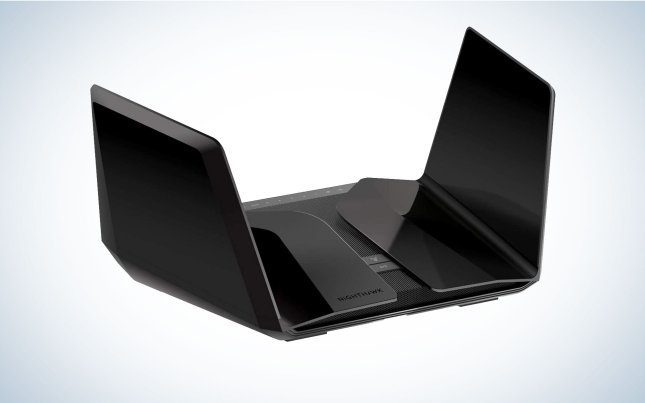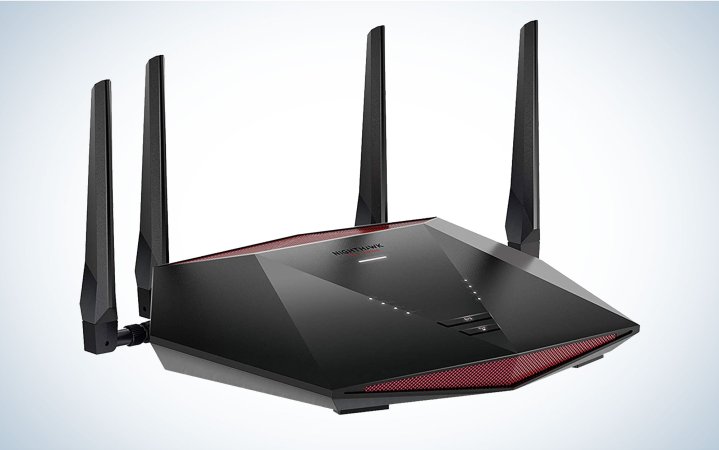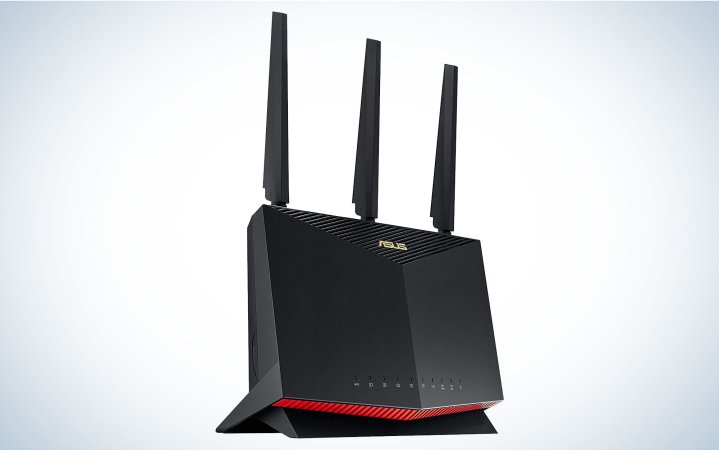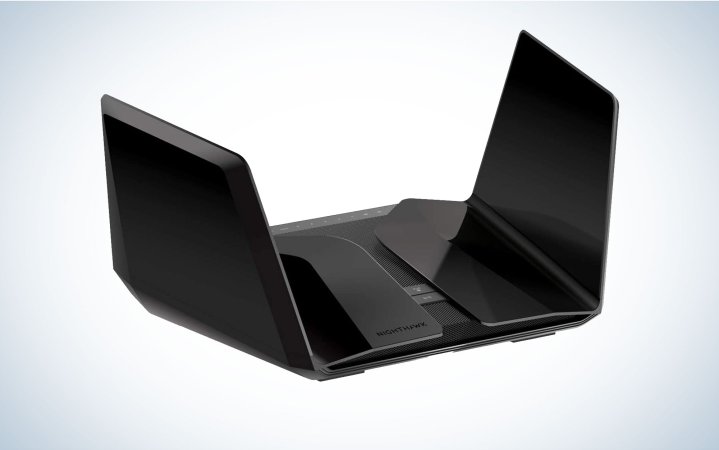We may earn revenue from the products available on this page and participate in affiliate programs. Learn more ›

Since the days of dial-up, gamers have always been the most demanding internet users in most households. Anyone who’s played competitive online games knows the brutal sting of losing a match because your connection lagged at a crucial moment. A speedy, uninterrupted connection is essential. With the explosion of streaming as a pillar of gaming culture, the internet router has become an absolutely essential piece of gaming hardware. Fortunately, manufacturers are well aware of this need, and so there’s a wide field of gaming-specific networking gear to choose from. This rundown of the best gaming routers will help you make an informed decision by demystifying terms like WiFi 6, link aggregation, and more.
How we selected the best gaming routers
There are more new gaming routers every year in an already bustling category, so we had plenty to choose from when selecting the best for a variety of use cases. We selected these specific routers based on testing, reading professional router reviews, and consumer recommendations. Our picks feature the specs gamers want, and perform as well as their manufacturers claim.
- Best overall: Netgear Nighthawk XR1000
- Best WiFi 5: Asus RT-AC86U
- Best all-purpose: Asus RT-AX86U
- Best WiFi 6E: Netgear Nighthawk Tri-Band Wi-Fi 6E Router (RAXE500)
- Best mesh: Asus ZenWiFi AX (XT8)
The best gaming routers: Reviews & Recommendations
The best gaming routers are, generally, WiFi 6 routers with special, gaming-focused features. That’s a pretty narrow definition, but there’s still a fair amount of options, each of which comes with its own set of features, quirks, and variations. There are also, frankly, plenty of great non-gaming routers that will do wonders for your network stability without any games-related branding. This list runs a wide gamut to guide you to the right router for your needs.
Best overall: Netgear Nighthawk XR1000
Networking for a competitive edge
Specs:
- Speed: 5400 Mbps, WiFi 6
- Wired LAN Ports: 4
- USB Ports: 1
- Antennae: 4
- Bands: 2
- Security: WPA2, WPS, WPA3
| Pros | Cons |
| Excellent performance | Expensive |
| Easy installation | Smart gaming-focused tools and optimizations |
| Smart gaming-focused tools and optimizations |
The Netgear Nighthawk XR1000 is a fast and powerful WiFi 6 router from a reputable brand, with a predictably high price tag attached. It’s specs are solid and its connection is good, but it’s the specialty software that makes it stand out as the best gaming router. In addition to expected features like parental controls, anti-malware, and traffic prioritization, the XR1000’s DumasOS also has some smart, gaming-specific features, like Geo-Filter and Ping Heatmap, both of which work in concert to test and track the connection latency to different servers available and select the fastest option.
Best WiFi 5: Asus RT-AC86U
Bandwidth on a budget
Specs:
- Speed: 2900 Mbps, WiFi 5
- Wired LAN Ports: 4
- USB Ports: 2
- Antennae: 3
- Bands: 2
- Security: WPA, WPA2, WPS
| Pros | Cons |
| Fast | Only vertical orientation |
| Great value for money | No WiFi 6 |
| Robust features |
Budget-conscious gamers have long known that one of the best ways to save money is to be a late adopter. WiFi 6 is the hot new thing, but that makes it an easy corner to cut if you’re looking to save money. Hyper-competitive players, we’re looking at you: You’re probably hooking up your PC and consoles with an ethernet cable anyway.
The Asus RT-AC86U delivers solid performance, and comes with great software features including built-in malware protection and traffic prioritization. It can only be set up vertically which could annoy some, but that’s a small price to pay for the best WiFi 5 gaming router.
Best all-purpose: Asus RT-AX86U
A gaming router that’s great for everything else, too
Specs:
- Speed: 5700 Mbps, WiFi 6
- Wired LAN Ports: 4
- USB Ports: 2
- Antennae: 3
- Bands: 2
- Security: WPA2, WPS, WPA3
| Pros | Cons |
| Excellent speed, range, and latency | Large and inflexibly oriented |
| Multi-Gbps WAN and LAN ports | |
| Powerful and user-friendly management app | |
| Easy installation |
The Asus RT-AX86U doesn’t have as many gamer-specific software features as our top choice, but its excellent WiFi 6 performance and mid-range price makes it the best all purpose gaming router if having the best connection is your only concern. The more modern, WiFi 6-enabled version of our budget pick has similarly excellent performance, and more specialty features, including a 2.5 Gbps LAN port and a built-in firewall. The one thing Asus didn’t improve on, unfortunately, is the mounting situation: The RT-AX86U can only stand vertically, so you’re locked into that tall router life.
Best WiFi 6E: Netgear Nighthawk Tri-Band Wi-Fi 6E Router (RAXE500)
WiFi 6+
Specs:
- Speed: 11000 Mbps, WiFi6E
- Wired LAN Ports: 5
- USB Ports: 2
- Antennae:8
- Bands: 3
- Security: WPA2, WPS, WPA3
| Pros | Cons |
| Excellent WiFi 6E performance | Very expensive |
| Multi-Gbps LAN and WAN | WiFi 6E is barely in use yet |
| Robust and useful software |
If money is truly no object and you want to make a lavish gaming router purchase, WiFi 6E is brand new tech for early adopters. On top of all the benefits from the still-new WiFi 6, 6E adds a 6 GHz frequency band on top of standard 2.4 and 5GHz signals, which can transmit more data at higher speed. For gaming, it can close the speed gap between wireless and wired connections. However, just like in the jump from 2.4 to 5 GHz, 6 GHz WiFi trades higher speed for a lower range connection that doesn’t handle interference as well as lower frequencies.
The Netgear Nighthawk RAXE500 stands out as the best WiFi 6E gaming router in a very small field of 6E routers for its great performance and design. For gaming in particular, the combination of 6E wireless and 2.5 Gbps LAN means you will be able to get the absolute most out of any internet connection in the foreseeable future. That said, not many products actually use 6 GHz yet–it isn’t compatible with either the PlayStation 5 or Xbox Series X–so you would be paying a high premium for a feature that you won’t be able to use for quite a while.
Best mesh: Asus ZenWiFi AX (XT8)
Roam if you want to, game around your house
Specs:
- Speed: 6000 Mbps
- Wired LAN Ports: 7
- USB Ports: 1
- Antennae: 6
- Bands: 3
- Security: WPA2, WPS, WPA3
| Pros | Cons |
| Easy installation | Moderately expensive |
| 3 bands | |
| Multi-Gbps LAN | |
| Traffic prioritization |
Having the best mesh router will allow for better coverage over large spaces by using multiple wireless access points. Mesh routers for gaming haven’t yet caught on as a discrete category, but the Asus ZenWiFi AX XT8 stands out as a good option for most of people, including gamers. It covers the basics: It’s easy to set up, fast, and future-proofed with WiFi 6. It also features a 2.5 GHz LAN connection, where most only have gigabit ethernet. It also features built-in security software and traffic prioritization QoS options, which are key features we look for in dedicated gaming routers.
The Asus ZenWiFi AX XT8 is expensive, but that’s kind of a given with a good mesh system, since you’re paying for multiple routers. On the bright side, though, when you set them up properly, you shouldn’t have to worry about internet dead zones around the house ever again.
What to consider before buying one of the best gaming routers
As with most specialized gaming equipment, the best routers for gaming tend to have more powerful hardware than you’d expect in your average ISP-supplied router. Like computers, routers have processors and memory, and having one that’s more powerful will enable your home network to handle a lot of throughput with minimal lag spikes.
As a rule of thumb, a good gaming router will feature a multi-core processor and at least 256 MB of RAM. The router’s internal hardware, particularly RAM, affects how much data it is able to process without slowing or stuttering, and could become a bottleneck if you have many devices on your network at once. A choked-up network can prevent you from getting the maximum upload/download speeds offered by your home internet service plan.
You also need to consider where you plan to put your router. A centralized location helps ensure your router’s signal reaches your whole home. You should be aware that walls and dense physical objects can interfere with the signal. A less expensive router will handily cover a studio or one-bedroom apartment, but you may need to invest in something more powerful to cover a house. If a single router still won’t cut it, or there are dead spots on account of interference, you can expand a router’s range with a WiFi extender, which can rebroadcast and extend the signals from existing routers.
What is WiFi 6 and do I need it?
The WiFi Alliance, the independent company that maintains wireless networking standards, retroactively added a consumer-facing number system to match the legacy IEEE wireless standard names like 802.11ac and 802.11n. The newest version is WiFi 6, also known as 802.11ax, which launched in 2019.
We’ve put together a thorough explainer on everything new in WiFi 6, but here’s the short version: WiFi 6 was designed to accommodate the current boom of smart, internet-enabled devices that are flooding home networks everywhere. It’s faster, and can work with more devices before you start to see serious drops in network performance. As with all prior standards, it’s fully backward compatible with all the previous wireless networking standards. Only newer, WiFi 6 compatible devices can take full advantage of its potential, you don’t need to worry that your devices won’t be able to connect.
If you are interested enough in upgrading your network to seek out a gaming router, you will probably want to make sure whatever you buy meets the newest wireless standard. That being said, if your online gaming is mostly wired by ethernet (which you really should try to do with your PC and console before going wireless anyway), then getting an older WiFi 5 router for gaming can be a good way to cut costs. For many people, it will still be a big upgrade.
Check your router speed, and your ISP’s
The primary spec you will typically see with a router looks something like “AX5700.” The letters refer to standard–“AX” is shorthand for “802.11ax,” A.K.A. WiFi 6–and the number refers to the combined maximum speed it offers across all bands (in Mbps). In practice, the actual speeds you get for any one device will likely be lower, and depend on various factors like its placement and interference between it and the router.
You should also make sure that your router can handle the maximum bandwidth offered by your internet service plan or higher. You want to make sure that your spiffy new router can actually achieve that top speed you’ve been hoping to achieve. In general, you want to stick pretty close to the maximum speed set by your ISP. You can buy a slightly more powerful router to future-proof the hardware, but it would be a waste to spend extra money on a Gigabit-capable gaming router if you don’t plan to upgrade your service.
Security
Like the wireless networking standards, wireless security comes in a few jargon-heavy flavors. WEP (Wired Equivalent Privacy) is the original protocol for secure WiFi transmissions, but is generally considered to be insecure and out of date. For contemporary routers, you want to make sure that they are compatible with one of the newer forms of WiFi Protected Access, or WPA, protection. A good router should have WPA2, which is the current standard. A great one will support the newer and more secure version, WPA3. WiFi 6 routers are much more likely to support WPA3, offering yet another reason to prioritize them over older models.
Some wifi routers also support WPS (WiFi Protected Setup), a common extension of WPA that allows for a simple, push-button connection between devices. Once a valuable feature, security experts now recommend people avoid using it due to some fundamental vulnerabilities to using brute-force attacks to guess the PIN and access the network (the cost of convenience!). Many wifi routers also offer security features, such as malware protection and parental controls, which may be worth considering.
Gaming-specific features
Besides general strong performance, the best routers for gaming tend to feature specialty software that ensure your game is always stable. Most common among these is some kind of bandwidth management. Most routers offer some amount of this, but gaming routers tend to give the user more specific control over what network traffic is prioritized. Other features revolve around things like minimizing ping and intelligently choosing servers.
Many gaming routers also feature three bands. Where most routers have a 2.4 GHz and a 5 GHz band–essentially two separate networks–tri-band routers add a second 5 GHz band to reduce network congestion. If your wireless network is very crowded, having a dedicated band for game consoles and PCs may help keep things stable.
FAQs
For online gaming, absolutely! The quality of your router determines the quality of your internet connection, which needs to be extra smooth for live online gaming and streaming. If you want to be able to honestly complain about bad netcode when the gameplay stutters, ensure that the connection is strong on your end.
Even if you aren’t playing online multiplayer games, having a faster, more stable connection means you download games and patches faster.
Being performance-focused, gaming routers will ensure a good connection on your end, which mitigates ping. Additionally, some gaming routers, like our overall pick, have software features that further reduce ping by intelligently tracking and selecting the fastest servers from around the world to connect with.
Gaming routers are typically more expensive than their civilian counterparts on account of their high performance and additional features. You should expect to pay anywhere from $300-400 for a great gaming router, though there are budget-conscious options out there for as little as $150. There’s always a higher splurge, as well, with routers on the most cutting edge 6E standard costing $600 and beyond.
Final thoughts on the best gaming routers
- Best overall: Netgear Nighthawk XR1000
- Best WiFi 5: Asus RT-AC86U
- Best all-purpose: Asus RT-AX86U
- Best WiFi 6E: Netgear Nighthawk Tri-Band Wi-Fi 6E Router (RAXE500)
- Best mesh: Asus ZenWiFi AX (XT8)
Gaming routers aren’t all colored LEDs and convex angles–for online gaming, performance is king. Now that the next generation of wireless is in full effect with WiFi 6, it’s the perfect time to upgrade your router, whether you’re jumping to the latest and greatest, or taking advantage of price drops on the slightly-older-but-still-great options. No matter your budget, you should be able to find a great router to start your career as a pro streamer (or grind dailies while chatting with your pals).

